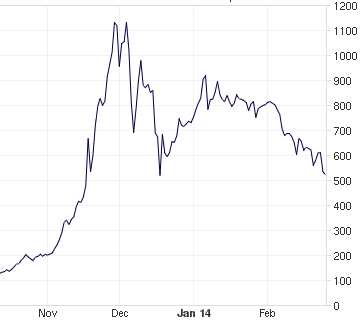
Bitcoin's chart looks like a penny stock
right after its promoters send out 10
million emails.
Not long ago, we gave you the inside skinny on Bitcoin -- both its strengths and weaknesses. However, the deluge of promotional emails and ads we've witnessed in the past few weeks has compelled us to revisit the issue.
We're frankly concerned people could get hurt financially
Free-market analyst Bill Fleckenstein, an MSN columnist and investment manager, appeared on KWN last week and labeled the cryptocurrency a "chain letter" that has even less backing than the U.S. dollar.
At least the dollar has a government behind it that can raise taxes to shore it up, Fleckenstein noted. A far cry from something like gold or silver, Bitcoin has no tangible backing of any kind and relies purely on persuading others to hand over things of value in exchange for electronic entries.
Heavy internet marketing by certain newsletter publishers has helped fuel a 500% increase in the "value" of Bitcoin in the past two months. The drop could be just as dramatic.
The situation reminds us of those penny stocks you occasionally see promoted. Yes, adept speculators can jump in, get out, and make some real money. But many will lose most or all of their investment -- depending on which particular day they acted on the "hot tip."
If you are considering putting one thin dime into Bitcoin, please get the facts first. Caveat emptor!

About the Author:
Clint Siegner is a Director at Money Metals Exchange, a precious metals dealer recently named "Best in the USA" by an independent global ratings group. A graduate of Linfield College in Oregon, Siegner puts his experience in business management along with his passion for personal liberty, limited government, and honest money into the development of Money Metals' brand and reach. This includes writing extensively on the bullion markets and their intersection with policy and world affairs.





